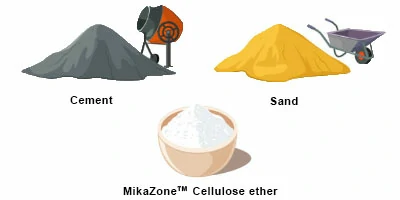First of all, let’s learn about adhesive mortar for tiles, nowadays, two kinds of adhesive agents are generally used to paste tiles, one is a traditional cement mortar, and the other is a special tile adhesive agent. Both of them can effectively paste tiles, so what is the difference between them? Which one is better?
Traditional cement mortar
Traditional cement mortar is a mortar made of cement, fine aggregate, and water, i.e. cement + sand + water, as needed.

Tile adhesive
Tile adhesive is a ready-made mixture made from Portland cement, polymers such as epoxy, and selected aggregate particles with some additives added in it to improve its property for laying tiles.
The difference between the two types of adhesive mortar for tiles
1. Tile adhesives are simple to use by adding the right amount of water and mixing, whereas in cement mortar the sand is usually river sand, which makes it difficult to control the particle size and quality.
2. Tile adhesives can easily hold larger size stones than cement mortar.
3. The cement mixing process is dusty and dirty, while tile adhesive has a low dust process and provides a clean workspace.
4. When using cement mix to lay tiles, the tiles need to be soaked in water for at least a day, whereas tile adhesives do not require the tiles to be soaked in water, increasing the efficiency of construction.
5. Cement mixtures have poor bonding strength while tile adhesives have higher bonding strength due to the addition of necessary additives.
6. Tile adhesives require a thinner mixture than cement mixtures, which results in a lighter load on the building structure.
7. Cement mixtures save material costs for construction, and tile adhesives cost more.
8. Cement mixtures are mainly used in construction, while tile adhesives are preferred for decorative areas.
Which is the best choice?
In summary, tile adhesive is superior to traditional cement mortar adhesives when pasting tiles, face tiles, floor tiles, and other decorative materials. The bonding strength is several times that of cement mortar. It can effectively paste large tiles and stones, avoiding the risk of falling tiles, good flexibility, and preventing the generation of drums. Secondly, tile adhesive contains a variety of additives, generally thickened cellulose ether (HPMC|HEMC) and increased tile adhesion of RDP powder, the addition of RDP powder can greatly increase the flexibility of tile adhesive and improve the stress and increase flexibility.
